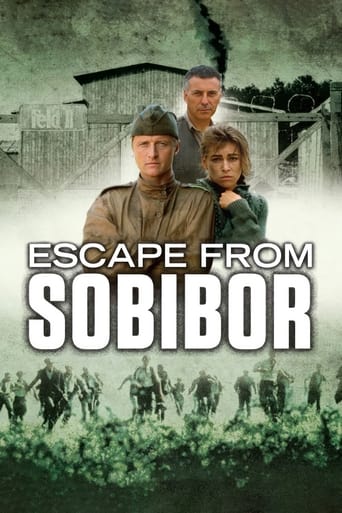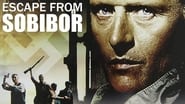tomsview
If you didn't know this film was based on fact, you would think it was just typical movie exaggeration.It's an incredible story. Aware that they will eventually all be killed, the Jewish workers at Sobibor extermination camp in 1943 plan to revolt. Their leader, Leon Feldhendler (Alan Arkin) realises that the only way to stop the SS punishing those left behind is for all 600 to escape.When a group of Russian Jewish prisoners of war arrive at the camp, Leon believes that these trained soldiers offer the chance they have been waiting for. He joins forces with their officer 'Sasha' Pechersky (Rutger Heuer) and together they devise a plan to kill the SS men in the camp, which will render the mainly Ukrainian guards leaderless.More than just dealing with the escape, the film recreates the system the Nazis used in all the death camps such as Auschwitz, Treblinka, Belzec as well as Sobibor. The film starts as Jews arriving by train are fooled into thinking they have arrived at a work camp, but in reality they are then selected according to their usefulness with most going straight to the gas chamber, disguised as showers. Their possessions are then sorted by Jewish workers who themselves survive only as long as they are able to perform a service for their Nazi masters.The film has a number of disturbing scenes. A new arrival, although selected to work, searches for his wife and child, until he is informed that they are already dead. When he is shown the glow above the crematorium, he finally realises the true purpose of Sobibor. A young boy on an errand is traumatised when he comes across lines of naked women and children being ushered into the 'showers'.The film is not overly gory or graphic, but we get the picture. Without comparing them, "Escape from Sobibor" is as compelling as Spielberg's "Schindler's List". Both films are about events in the Holocaust that were outside the norm; not many Jews escaped as they did from Sobibor, and not many were saved as were those by Otto Schindler.The only thing that betrays the film's TV roots are a couple of fade-outs for ad breaks; otherwise this is a big scale production with well-handled action scenes. Few films of this kind stick as closely to the known facts; even the romantic interest provided by Joanna Pacula's character, Luka, is true.If I have one criticism it would be Georges Delerue's score, which seems overly emphatic at the end. But that aside, this is a tense, riveting film, which does justice to a desperate act of heroism.
qormi
This film displayed the brutality and heartless cruelty inflicted on the Jews at the hands of the Nazis. It was heartbreaking to watch boxcars delivering unsuspecting victims to the death camps, seeing families separated, not knowing that they would never see each other again. It was shocking to see the random brutality of sadistic Nazi guards beating helpless men and women; even unleashing attack dogs on innocent children. It was shocking to see hundreds of naked men, women, and children lined up and herded into the gas chambers and to hear their screams as they were gassed. Later, the night sky was aglow with the fires of the crematorium and the billowing smoke filled the daytime air. The ordeal of a young woman trying to hide her month-old infant from the demon Nazi overseer as she slaved in the sewing factory is heart wrenching and unforgettable. The scene where a young man breaks down when he is told that his wife and son were killed will leave you traumatized. This was a true story and Arkin, Hauer, and the rest were excellent.
Bene Cumb
It is a British/Yugoslavian film about the mass escape from the extermination camp at Sobibor, the most successful uprising by Jewish prisoners of German extermination camps. It is full of contrasts, both moral and attitude-related, and gives a realistic overview of daily life of Jewish prisoners and their involuntary development from peaceful craftsmen into protagonists and organizers. The escape plan is hard to make out and not everything goes planned - even with Germans who are known for their punctuality and routines. However, if there are programs to kill on the basis on ethnicity, race or religion, you cannot expect leaking or treason, but a unified front against executors.All the cast is evenly strong, beginning with Alan Arkin and Rutger Hauer who received a Golden Globe Award for Best Actor in a Supporting Role (Television).Of course, this harsh film is not for everyone, but it would be useful as an history lesson - as the screenplay is based on real events and written by survivors of this uprising.
jzappa
Escape From Sobibor is one big explosive moment. It's about the only successful escape from a concentration camp during the Holocaust, and everything that happens, is said or is done has a direct connection of few degrees of separation. It is two hours long, but the beginning, middle and end flow into each other so completely, the tone so consistent throughout, that we hardly do any thinking back to what happened before. Perhaps it's more a series of pay-offs than any build-up, but then maybe I'm wrong.During October 1943, members of the camp's underground resistance succeeded in covertly killing eleven German officers and a number of Ukrainian guards. Of the 600 inmates in the camp, roughly half escaped. The escape forced the Nazis to close the death camp, dismantling it and planting a forest. And in this concise, streamlined dramatization of this episode in world-changing, paradigm-shifting war, a universal struggle for survival, it's as if all the scenes are the cells composing a body. Each one is clear-cut and specific, reaching a different purpose, but they all rally to cohesion. Transitions occur by shifting time, space, perspective, creating a streaming feeling, avoiding dull or unexciting moments, not that there are a whole lot of those in a concentration camp. The editing, invisible as it is, as editing must be, has a lot to do with the film's impact. It's cut based on time, using the visual composition of each shot, increasing and decelerating the speed of the metric cuts in relation to suspense, which is ceaseless.Escape From Sobibor is not like other TV movies so much in the mawkishness department. It has narration, which I should say in bold print to be sure, but it's never quite redundant. It actually strengthens the movie's cohesion, further encapsulating the events, or event. And the acting is never too far over the top. It just seems that every actor, familiar or not, nobody standing out more or less than anyone else, makes their own choices, director Jack Gold letting himself basically be border patrol for them while they do what takes the most mental interest for them. Alan Arkin and Rutger Hauer are a heroic duo I probably wouldn't have thought of myself, and they're an interesting, engaging pair.




